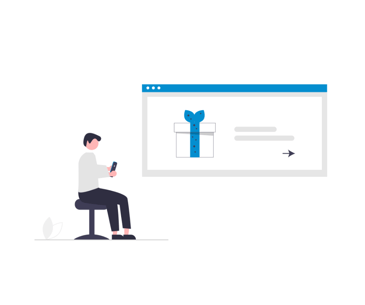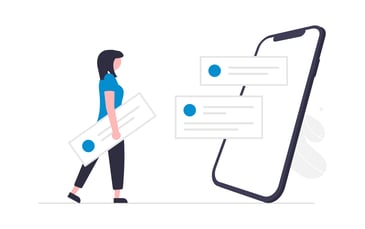How to respond to negative Google reviews: Examples
In today's digital age, online reviews have become a core part of any business' reputation management.
From the latest customer experience data to trends in gathering customer feedback our blog hosts the latest articles on a wide range of CX topics.

In today's digital age, online reviews have become a core part of any business' reputation management.

For many businesses, Facebook reviews are bittersweet. Customer review platforms provide transparency and social proof so that anyone can see for themselves what a particular brand is like. But sometimes, negativity can take hold.

It can be a challenge for small businesses to get the visibility they deserve, especially in such a competitive market. So what’s the secret?

If business growth sounds good to you, a Google Business Profile is the first step. Google My Business is a free tool for companies to manage their online presence across all Google platforms.

Google star ratings are often used by customers to assess how credible a brand is. So how do you improve yours?

It’s no secret that Google reviews about your brand are a major influence on prospective customers. That’s because customers trust other customers more than the brand itself, simply because they are more objective.

Although customer feedback and reviews are often used interchangeably, they are not the same thing.

Google is the biggest search engine in the world. It’s how millions upon millions of people discover their new favourite things. It’s how they get answers to important questions and find solutions to problems instantly. But when you’re presented with a plethora of options with each search there’s one sure-fire way to discover which solutions are reputable, and which might not meet everyone’s standards.

Since the rise of the digital age, being online has become an integral part of the business world. However, there are several risks involved in being online so it’s important to know how to monitor and influence your business's digital reputation. That’s where online reputation management or ORM comes in.

It’s common for businesses to avoid customer feedback because of the fear it could expose them to bad reviews. Because of this, many businesses choose to dismiss customer feedback and suppress any issues they might raise. However, this is a huge mistake as it wastes critical information and leaves customers feeling neglected. On the other hand, asking customers for feedback allows businesses to improve their processes and build customer loyalty.

Reviews are proven to influence prospective customers and their buying habits. 90% of people said that they had their purchase decision influenced by a positive review. Yet only 34% of companies are implementing a customer journey map. This disconnect can be down to a number of factors including that many businesses fear negative online reviews, and don’t know how to deal with them should they occur. By encouraging online reviews in general there’s an increased chance of bad experiences slipping through the net, and being unprepared, or unwilling to face those criticisms is stopping many businesses from fully tapping into the potential of online reviews.

Gathering customer feedback offers excellent insights as to why some customers keep buying from you and areas where you can improve. However, it’s not always easy to get customers to give feedback, which can be frustrating for businesses desperate for insights into people’s experiences with them.

If you’re on the hunt for a customer feedback platform then you might quickly find yourself overwhelmed with options. Depending on what you’re after there are dozens of solutions on the market, with more being added all the time.

Customer feedback and reviews are an integral part of businesses across the globe and are growing in increasing importance. Nowadays both feedback and reviews are being utilised to transform operational structures to prioritise the customer. They are integral for understanding untapped areas of growth and honing in on problem areas that need to be prioritised. The push to create a customer-centric business is driven by feedback, and that won’t be going away any time soon. That’s why it’s important you know how to use both feedback and reviews for the betterment of your business.

We’re guessing that before you made your last purchase, or visited a restaurant you checked the online reviews…Are we right? It’s common practice to browse the web and read a product or service review before you go and spend your hard-earned money.

It’s amazing how one new feature can make the biggest change in terms of premium functionality. Our latest feature is a certified game-changer for Review Tui. We thought we’d take this opportunity to introduce you to it: Campaigns! We’ll walk you through exactly what a Campaign is, its use case, as well as some of the benefits your business will reap from using it. We’ve even recorded a short video to show you how it works - yes, we’re that excited!

It’s pretty common these days for a business to request your feedback on your experience, whether that be in-person, via an online survey, or through a feedback box, to list a few. But what differentiates such feedback from a testimonial to a review? At the end of the day, both feedback types are very similar so is one more beneficial than the other when it comes to growing or obtaining more business?

We've finally completed a major update which enables users to take control of the valuable questions they ask customers. Not only that but we've delivered this with an exceptional interface to make survey management easier than ever.

After a couple of months of slow progress, we've finally found the gas pedal and wow, what a difference a month makes! In this review platform update, we showcase the latest developments.

“If you don’t ask you don’t get” is a popular phrase used to guide people towards getting something they want. A pay rise, a better parking spot or even some constructive criticism are more likely to come to those that ask for them than those that sit and wait for it to come to them. Yet when it comes to customer feedback many businesses refuse to ask because of one major fear: getting bad feedback

Online reviews are very important. Customers check out reviews to see if other people have had a great experience or regret ever buying from you. They can be even more powerful than testimonials and can even help your business do better than your competitors in Google searches.

The internet is a vitally important tool for any business looking to be found. And whereas this is true of all businesses it’s especially true of small businesses servicing a local area with 82% of smartphone shoppers conducting ‘near me’ searches (Search Engine Land, 2018) with these types of searches increasing by over 900% in the past 2 years (Think with Google, 2018 - source).

Receiving negative feedback can be quite an emotional experience, especially when you’ve invested yourself in the experience your customers receive. It can often feel like a personal attack and you can feel robbed of the opportunity to protect your reputation when that negative feedback is shared online for the world to see.

Customers are fickle creatures. The vast majority may love you for a short period of time but with so many other businesses vying for their attention they’re quick to forget the effort you put into making them happy. Even when you have a loyal base of customers all it takes is one foul step and that loyalty is gone.

It's time to look back at the previous month and update you on the progress we've made with the main application and how we're tracking towards launch.

It's time for our monthly recap on what's new and what's to come but with the added impact of a global shutdown to contend with! In March we were confident that disruption to the app's development would be minimal as we could easily continue from home but in reality the situation proved very different.

It’s difficult asking for customers to leave reviews or testimonials but there are a breadth of platforms out there designed to make this task slightly easier. In this article we'll explore a few of them to help you find the right one for your business.

If you’re not familiar with NPS® it stands for Net Promoter Score® and is a calculation used across the world by businesses large and small to ascertain whether their overall customer experience is positive or not. It is mostly based on a score from 1 to 10 with the following question at its core “on a scale of 1 to 10 with 1 being not at all likely and 10 being very likely how likely are you to recommend [insert business name] to someone else?”.